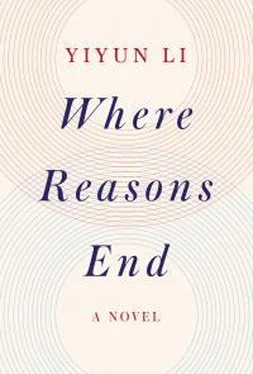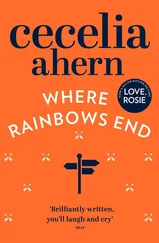You understand me without knowing me? he asked.
Let’s face it. Death is a divide no matter how little you and I believe its power to separate.
Is that how my friends feel too? That there is a divide between them and me?
A few of Nikolai’s friends had written to him, remembering the time they had spent together, and asking why he had departed so abruptly. Others had written to us, remembering the time they had spent together, not asking what had made him depart so abruptly.
In some ways, I said, they don’t feel that at all, but in other ways they feel it keenly.
I must point out a sentence like this is meaningless, Nikolai said. You can apply it to any situation to sound so profound.
For the record, I want you to know I’ve never used profound in my writing, I said.
Well, that is one adjective I wouldn’t defend.
But I’ve been thinking about your friends’ letters.
Don’t make fun of their writing skills.
Nikolai’s death was a difficult thing for people to talk about, but his friends, when they wrote, did not have to resort to the ready words because of helplessness, awkwardness, or politeness. They wrote from a place where Nikolai was still one of them and where they were told that he was no longer one of them.
If there is one thing to make fun of, I said, it’s how quickly we grownups are at a loss for words in an unfamiliar or unwanted situation.
Unfamiliar or unwanted?
Sometimes it’s hard to tell the difference.
An unfamiliar situation doesn’t have to be unwanted, he said. Like love at first sight.
You’re a true stickler.
You’re the one to say precision, precision, precision.
What about this? We grownups quickly feel at a loss for words when what words we have can’t do half of what we want them to do.
Half, or a quarter?
We feel at a loss for words when they can’t do fully what we want them to, I said.
They never can, Nikolai said.
Precisely.
Why not make do with the percentage they can achieve? he said.
Imagine writing a letter of condolence, I said, like this: I know my words are not enough to express my devastation at your loss and my words will not do much to alleviate your pain, but these words are all I have…
Sounds reasonable to me, Nikolai said.
I’m not done yet, I said. These words are all I have and we must make do with them, believing, both you and I, in the largesse in even such paucity.
So people are too modest to say that?
Or self-conscious, I said. Not knowing what to say. Not wanting to say the wrong thing perhaps.
What’s the right thing to say?
There’s no right thing or wrong thing to say in this situation. Your friends all seem to know what to say.
That’s because they are my friends.
No, not only that. They are your friends, but they are young, too.
That’s so ageist, he said. You should not hold it against anyone because he or she is young.
Rather the opposite, I said. What I’m trying to say is, we were young once. And your friends one day will grow up and become as gormless as we are. They will lose that one thing they have now.
What is it?
Your friends meet you where you are.
Where else can they meet me?
Yes, but think of what extraordinary courage they possess to meet you where you are. We grownups tend to get stuck with a fact, and for many people you have become a fact. Hard to accept. Impossible to understand. Still, you are a fact and that is how they will prefer to think of you and remember you now.
Not me, but my death, he said.
Important correction, my dear.
What do people do when they can’t accept something they don’t understand?
They ask, How could that happen? What went wrong? Or, they say things to the effect that in the direst situation there is a bright side if we let words like love and hope work their magic.
Does that bother you?
No.
Why not?
Because people who know you and people who know me meet us where we are. People who don’t know you and people who don’t know me are only facts. Flawed or limited, whichever adjective you prefer.
Just as we are flawed facts for them.
Exactly, I said.
Do facts meet then?
In fairy tales, I said, but not in this life.
Or in any life, Nikolai said.
11
Wishing You Were Somehow Here Again
W ishing you were somehow here again, wishing you were somehow near.
The line had been circling in my head. A little over a year ago I had lost a dear friend, and for days I had been listening to the song. Help me say goodbye, as though the departed had the wisdom, the courage, the inclination to lend a hand to us. Who helps them say goodbye? Not us, the living, limited by our living selves.
So many songs, like so many people. They come and go, or are never encountered. There must be a time in one’s youth when real life seems to be in a thousand songs yet to be discovered, or another thousand songs destined to slip out of reach, not heeding one’s wish to make them permanent. Does the shift come to all—or to some of us only—that the few songs that do stay, by fortune or by fate, are more prodigious than the whole world can offer?
I wish you were here today, I said.
You say that every day, Nikolai said.
I don’t, I said.
You think that all the time, he said. If you don’t say it aloud it’s because you don’t want to sound wimpy.
I don’t want to sound wimpy, I said, and I’m not wimpy all the time. But I do wish you were here today. It’s been snowing.
The snow, the first of the season, had begun in the morning. By late afternoon, the tiny prints of paws and the not-so-tiny prints of sneakers, left early on the patio by the dog and J., who had both seen snow falling for the first time, were covered again. For a while I had been sitting still, my chin cupped in my hands, my elbows on the table, watching the snow fall, until I realized that the pose was a reproduction of a famous still from a 1970s Taiwanese film, of a dreamy high school girl looking out of the window.
There is an idiom describing that, Nikolai said.
How strange and comforting, I thought, that my mind could wander but never far from his reach. Do you mean, mutton dressed as lamb? I said.
Yes. I always have trouble remembering it.
You lose nothing by not remembering it, I said. It’s irreverent.
I like phrases of all kinds. I’m not as judgmental about words as I am about people.
It occurred to me then that the pose also belonged to Charles Bovary, who, with his chin in both hands, watched Emma with “stupid serenity.”
Serenity is an overused word, Nikolai said.
Stupid is a necessary adjective here, I said.
I wonder if stupidity is one of the things that make the world go round, he said.
I hope not, I said.
We can argue about that, he said, but we will get nowhere. To think about it, stupid is a difficult word to use.
Why?
Because a three-year-old can use stupid correctly, he said.
Not so fast, I said. I happened to look up the word the other day. I encountered enough extreme stupidities for me not to investigate the word. Stupid, from Latin stupidus, be numbed, be astonished.
So?
So in a way the word is abused. It’s deprived of its more feeling root, I said. Something happens, and it stuns us, it numbs us, it dulls us. There is much more sense and feeling involved in stupidity.
How about—Nikolai said—stupid sentences so afraid of tripping on an Oxford comma that they have to avoid it.
Oh, those poor sentences should not shoulder the blame for decisions they cannot control, I said. Nikolai was an adamant advocate for the Oxford comma.
Stupid yeast that goes on strike in scalded milk, he said.
Читать дальше












